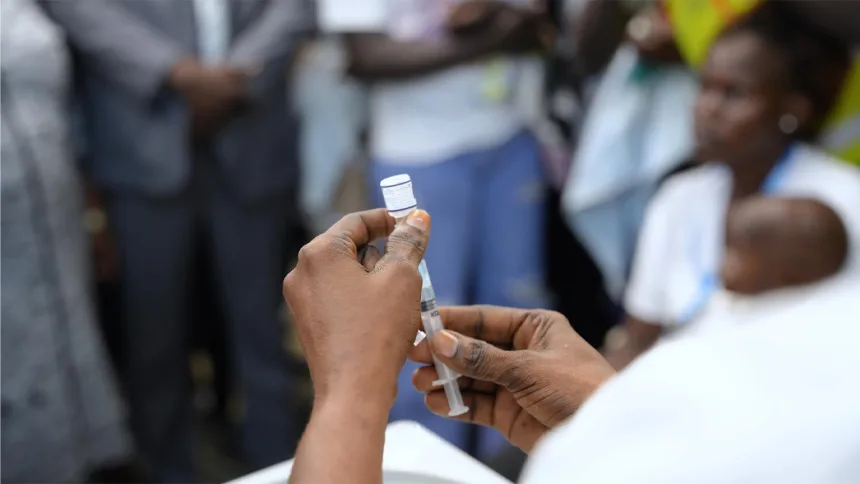April 2025- Apac, Uganda- Uganda’s Ministry of Health, with support from Gavi, the Vaccine Alliance (Gavi) and alliance partners, UNICEF, the World Health Organization (WHO), PATH and CHAI rolled out a malaria vaccination campaign in Apac District, northern Uganda. This makes Uganda the 19th country in Africa to introduce the malaria vaccine into routine immunisation and it is the largest vaccine rollout to date in terms of target districts and population.
The R21/Matrix-M malaria vaccine, administered in four doses at 6, 7, 8, and 18 months, will initially target 1.1 million children under two years in 105 high and moderate transmission districts across Uganda, with plans to expand nationwide.
Apac District is reported to have the highest number of mosquito bites per person globally (over 1500 bites per person annually).
Malaria is the leading cause of illness and death among young children in Uganda, responsible for up to 40% of all outpatient visits, 25% of hospital admissions and 14% of all hospital deaths, according 2022 data from WHO. In 2023, Uganda was among the top five African countries with the highest malaria burden, alongside Nigeria, the Democratic Republic of Congo, Ethiopia, and Mozambique.
The Minister of Health, Dr Jane Ruth Aceng Ocero said: “The introduction of the vaccine marks a significant milestone in our fight against Malaria. It is expected to prevent at least 800 cases of severe Malaria among children every day and ease the financial burden on families, saving them approximately UGX 15,000 per case that would have been spent on treating severe Malaria. I urge all parents and caregivers to ensure that children aged 6 to 18 months receive the Malaria vaccine at the nearest health facility. For the best protection, it is essential that the children complete all four doses on schedule.”
Also Read : WHO and Germany Sign €3.4 Million Agreement to Support Health Services in Yemen
Commenting on the historic rollout, Dr Sania Nishtar, CEO Gavi said: “With one of the highest malaria incidence rates globally, Uganda faces a relentless battle against this deadly disease that has devastated families and communities for far too long. The malaria vaccine, proven safe and effective, saves lives and prevents hospitalisations. However, without sustained financial support, these life-saving efforts could falter, leaving millions of children vulnerable and undermining the progress made so far. Continued funding is crucial to sustain and expand these efforts, ensuring that more children are protected, and more countries benefit from this vital tool.”
UNICEF, responsible for the procurement and air freighting of the vaccines and raising awareness within the community to enhance demand for vaccines, reaffirmed its commitment to child health and immunisation efforts in Uganda.
“UNICEF is proud to support Uganda’s historic rollout of the malaria vaccine, which represents a significant milestone in our collective efforts to protect children from this deadly disease. This vaccine must be combined with existing preventive measures and this combination of preventive measures will create a powerful shield against malaria. We urge all parents and caregivers to ensure their children receive all four doses of this life-saving vaccine as part of Uganda’s routine immunization services,” said Dr Robin Nandy, UNICEF Representative to Uganda.
“Today marks a historic turning point in Uganda’s fight against malaria. By integrating the malaria vaccine into routine immunization, Uganda is taking a bold step to protect its children, save lives, and secure a healthier future. This vaccine is a game-changer, and together, we must ensure that every child receives it,” said Dr Kasonde Mwinga, WHO Representative to Uganda.




















